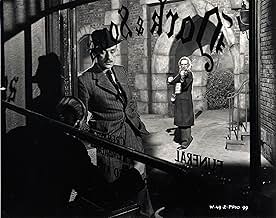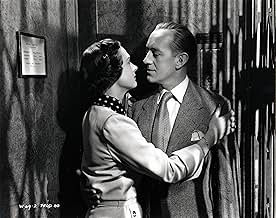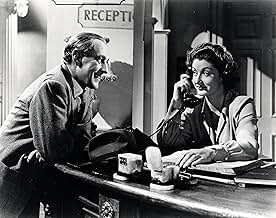IMDb RATING
7.3/10
2.3K
YOUR RATING
When a lonely, unappreciated farm-equipment salesman discovers he has only a few weeks to live, he withdraws his savings for a final holiday at a "posh" resort.When a lonely, unappreciated farm-equipment salesman discovers he has only a few weeks to live, he withdraws his savings for a final holiday at a "posh" resort.When a lonely, unappreciated farm-equipment salesman discovers he has only a few weeks to live, he withdraws his savings for a final holiday at a "posh" resort.
Grégoire Aslan
- Gambini
- (as Coco Aslan)
Eveline Kirkwood-Hackett
- Miss Hatfield
- (as Mme. Kirkwood-Hackett)
- Director
- Writers
- All cast & crew
- Production, box office & more at IMDbPro
Featured reviews
Although most Americans have little knowledge of his work other than Star Wars, Alec Guinness produced an amazing body of work--particularly in the 1940s-1950s--ranging from dramas to quirky comedies. I particularly love his comedies, as they are so well-done and seem so natural and real on the screen--far different from the usual fare from Hollywood.
This movie is the story of a man who thinks he is dying and decides to go out in style--living it up among the wealthy and well-bred. After all, he figures, he certainly won't need the money after he's gone! The marvelous acting and experiences among the upper crust make this a must-see. However, be forewarned, this is an incredibly depressing film. I doubt if I would have allowed the movie to be as dark as this one, but at least I can commend those who made it for not taking the easy way out and making a typical Hollywood style ending.
This movie is the story of a man who thinks he is dying and decides to go out in style--living it up among the wealthy and well-bred. After all, he figures, he certainly won't need the money after he's gone! The marvelous acting and experiences among the upper crust make this a must-see. However, be forewarned, this is an incredibly depressing film. I doubt if I would have allowed the movie to be as dark as this one, but at least I can commend those who made it for not taking the easy way out and making a typical Hollywood style ending.
Alec Guinness stars in "Last Holiday," a 1950 British film which was remade years later with Queen Latifah as the star. Though I enjoyed the warmth of the later version, the Guinness "Last Holiday," no surprise, is superior.
Guinness plays a lower class Brit, George Bird, who is told he is going to die of a rare disease and has maybe a few months left to live. George quits his job, takes his savings, and goes to stay at a ritzy resort. There, he changes, and circumstances change for him. With nothing to loses any longer, he becomes outspoken. He also wins at poker, croquet, and a horse race. He's offered jobs. And there's the possibility of romance.
This is supposedly a comedy, but it's not an uproarious one. It's more drama, in fact. George Byrd finds that all these wealthy people aren't all they're cracked up to be. He also finds out that when you let go and stop trying, opportunities appear. And he learns the difference between passing the time and doing something with your time.
Alec Guinness is brilliant as George, timid at first, gaining stature with his new clothes, and asserting himself once he gets to the resort. It's a beautifully layered performance.
Despite some sadness within the film, this is an excellent story of a man who learns life's lessons in a narrow space of time.
Guinness plays a lower class Brit, George Bird, who is told he is going to die of a rare disease and has maybe a few months left to live. George quits his job, takes his savings, and goes to stay at a ritzy resort. There, he changes, and circumstances change for him. With nothing to loses any longer, he becomes outspoken. He also wins at poker, croquet, and a horse race. He's offered jobs. And there's the possibility of romance.
This is supposedly a comedy, but it's not an uproarious one. It's more drama, in fact. George Byrd finds that all these wealthy people aren't all they're cracked up to be. He also finds out that when you let go and stop trying, opportunities appear. And he learns the difference between passing the time and doing something with your time.
Alec Guinness is brilliant as George, timid at first, gaining stature with his new clothes, and asserting himself once he gets to the resort. It's a beautifully layered performance.
Despite some sadness within the film, this is an excellent story of a man who learns life's lessons in a narrow space of time.
A small-town salesman, George Bird, learns that he is suffering from an incurable condition, leaving him only weeks to live. With no family or friends to care for, he decides to spend his modest savings on his first and last stay in a grand hotel.
The other guests soon notice that he is new to hotel life, and react to him in different ways - some disdainful, some intrigued and friendly. These guests reflect the old English class-system, with its myriad of sub-classes, starting to die out by 1950, largely because of the left-wing postwar government that had been so championed by J.B. Priestley, author of this screenplay.
Before long, Bird's life seems to be opening out, with job-offers, investment opportunities, even a chance of love. A bitter irony of course, as these opportunities will never be enjoyed (or so we are to assume).
The comfortable hotel life gets a jolt when the staff are suddenly called-out on strike, instantly shaking-up the class-system, as all the guests have now got to try to pitch-in and help, as best they can. This provides for a number of accidental meetings that move the plot forward dramatically. And the effect on Bird's humdrum life, suddenly turned roller-coaster, is dramatic indeed.
Interesting to see the yet-undiscovered Sid James as a dodgy gambler, and David McCallum's father (also David) on the violin, beginning and ending the story with a simple but curiously haunting theme.
For a film that has given so much pleasure - check the other IMDb reviews - it may seem spoilsport to suggest that Alec Guinness does not quite carry conviction as such a small and narrow character as Bird. This is someone who just earns his daily pittance and then goes home to read the paper and smoke his pipe. For this role, Guinness simply looks and sounds too cultivated, too sociable, altogether too biddable. (Ironically there was a character actor called Norman Bird, who would have been perfect!)
The other guests soon notice that he is new to hotel life, and react to him in different ways - some disdainful, some intrigued and friendly. These guests reflect the old English class-system, with its myriad of sub-classes, starting to die out by 1950, largely because of the left-wing postwar government that had been so championed by J.B. Priestley, author of this screenplay.
Before long, Bird's life seems to be opening out, with job-offers, investment opportunities, even a chance of love. A bitter irony of course, as these opportunities will never be enjoyed (or so we are to assume).
The comfortable hotel life gets a jolt when the staff are suddenly called-out on strike, instantly shaking-up the class-system, as all the guests have now got to try to pitch-in and help, as best they can. This provides for a number of accidental meetings that move the plot forward dramatically. And the effect on Bird's humdrum life, suddenly turned roller-coaster, is dramatic indeed.
Interesting to see the yet-undiscovered Sid James as a dodgy gambler, and David McCallum's father (also David) on the violin, beginning and ending the story with a simple but curiously haunting theme.
For a film that has given so much pleasure - check the other IMDb reviews - it may seem spoilsport to suggest that Alec Guinness does not quite carry conviction as such a small and narrow character as Bird. This is someone who just earns his daily pittance and then goes home to read the paper and smoke his pipe. For this role, Guinness simply looks and sounds too cultivated, too sociable, altogether too biddable. (Ironically there was a character actor called Norman Bird, who would have been perfect!)
Absent for years in Europe on both TV and Video, I finally managed to acquire this one on a VHS tape from the US. A man learns he has a short time to live and decides to make the most of it by living it up in a luxury hotel. His life suddenly becomes far more interesting, makes more money than ever before and luck generally smiles him in the face. I remember seeing it about Thirty years ago and wondered how a new viewing would affect me. There were one or two disappointments, I had a memory of the film being rather more romantic than it actually is ( nothing much actually happens on this side ) and parts of the film are rather 'chatty'. This said the overall story is quite original. The film captures that now long-lost atmosphere of a luxury 1950's English hotel in the bright sunshine presumably situated in Devon or Cornwall (as we see palm trees in the garden. There are many well-known actors and the script is quite original to say the least. Another of J.B. Priestley's stories 'An Inspector Calls' was also made on film and is actually very good, even better than 'Last Holiday'. Nevertheless, the haunting theme music (solo fiddle) and thedécors are A1. Picture and sound quality are very good for the time (1950) and I am surprised that the film is not readily available on VHS and DVD everywhere! Of course, Alec Guinness was a great actor and his performance here is totally up to standard. If the romantic side of it all had been pushed just a little further the film would have been perfect for me ! The ending of the film is the Wickedest and most unexpected in the history of cinema !
What makes a film good? In this case it's the writing that first draws you in. Writer and co-producer J.B.Priestly (The Old Dark House '32 ~ An Inspector Calls '54) has a way with words that compels the viewer to want to know more about his characters. With wit and a sense of mystery, he surrounds us with multi layered groups of people that are mostly drawn together by chance. In 'Last Holiday' the cruel hand of fate brings us face to face with ultimate irony.
It's filled with marvelous situations, at first upsetting, then wryly funny, leading to an unexpected ending that invites us to examine the way we not only relate to others, but how we treat them. Priestly is examining the bias that all too often accompanies class consciousness. The cast is exquisitely diverse, everyone from bit players to mains, deliver sterling performances under direction from Henry Cass (Glass Mountain '49). Welsh born Cinematographer: Ray Elton (Quartet '48) with his strong grounding in documentaries, brings a realistic look to the fine work of Scottish art director Duncan Sutherland (San Demetrio London '43 ~ The Human Monster '49).
I found the music score by Romanian born composer Francis Chargrin surprisingly melodic for a 50s film of this type. Its thoughtful main theme is equally likable as his later 'The Beachomber' in '54. You might also remember Chargrin for his 'Colditz Story' '55, and 'Grey Friars Bobby' '61. Those who enjoy the always professional performances of Alec Guinness will enjoy his generally dour role in this off-beat mini classic.
My viewing was hindered by Australian TV broadcaster Gem's, persistence in supering 'pop-up' adds for up-coming shows, and their ridiculous LARGE lolly 'Pink' station ID. At least this time they screened the full film after inadvertently leaving out a reel in an earlier screening! Sure wish this broadcaster would treat their viewers, and the films they run with far more respect!
It's filled with marvelous situations, at first upsetting, then wryly funny, leading to an unexpected ending that invites us to examine the way we not only relate to others, but how we treat them. Priestly is examining the bias that all too often accompanies class consciousness. The cast is exquisitely diverse, everyone from bit players to mains, deliver sterling performances under direction from Henry Cass (Glass Mountain '49). Welsh born Cinematographer: Ray Elton (Quartet '48) with his strong grounding in documentaries, brings a realistic look to the fine work of Scottish art director Duncan Sutherland (San Demetrio London '43 ~ The Human Monster '49).
I found the music score by Romanian born composer Francis Chargrin surprisingly melodic for a 50s film of this type. Its thoughtful main theme is equally likable as his later 'The Beachomber' in '54. You might also remember Chargrin for his 'Colditz Story' '55, and 'Grey Friars Bobby' '61. Those who enjoy the always professional performances of Alec Guinness will enjoy his generally dour role in this off-beat mini classic.
My viewing was hindered by Australian TV broadcaster Gem's, persistence in supering 'pop-up' adds for up-coming shows, and their ridiculous LARGE lolly 'Pink' station ID. At least this time they screened the full film after inadvertently leaving out a reel in an earlier screening! Sure wish this broadcaster would treat their viewers, and the films they run with far more respect!
Did you know
- TriviaThe film includes cast members who cropped up in various Alec Guinness films. Amongst them are Sidney James, Ernest Thesiger and Kay Walsh.
- GoofsBird states that he made about 9 Pounds a week. This is about 470 Pounds per annum. When his manager is trying to get him to stay he first offers to raise his salary to 400 Pounds p.a.
- Quotes
George Bird: How do you keep smiling with a stiff upper lip?
- ConnectionsRemade as Last Holiday (2006)
- How long is Last Holiday?Powered by Alexa
Details
- Release date
- Country of origin
- Language
- Also known as
- Ferien wie noch nie
- Filming locations
- Luton, Bedfordshire, England, UK(Shopping parade and Doctor's office)
- Production company
- See more company credits at IMDbPro
- Runtime
- 1h 28m(88 min)
- Color
- Aspect ratio
- 1.33 : 1
Contribute to this page
Suggest an edit or add missing content



































